Michael B. Jordan Just Mercy
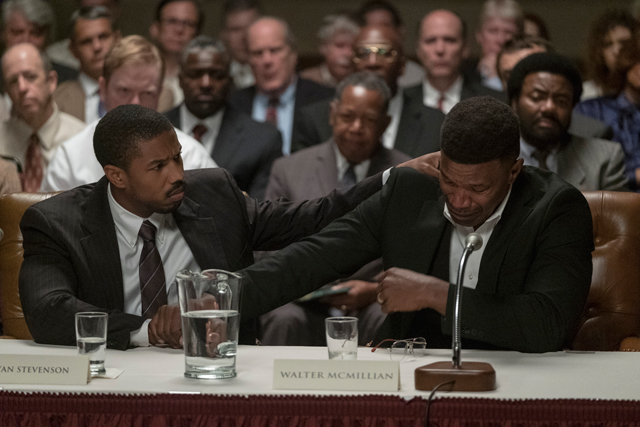
Every Generation Has Its Hero, Meet Ours.
Cast: Jamie Foxx, Brie Larson, Michael B. Jordan, Rafe Spall, O'Shea Jackson Jr., Tim Blake Nelson
Director: Destin Daniel Cretton
Genre: Drama
Rated: M
Running Time: 137 minutes
Synopsis: Just Mercy shadows world-renowned civil rights defense attorney Bryan Stevenson as he recounts his experiences and details the case of a condemned death row prisoner whom he fought to free.
Just Mercy
Release Date: January 23rd, 2020
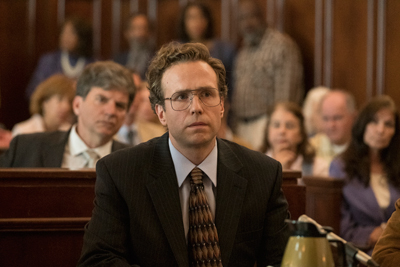 About The Production
About The Production
BRYAN
Your life is still meaningful,
and I'm going to do everything I can
to keep them from taking it.
In 1988, attorney Bryan Stevenson courageously chooses to go Alabama to fight injustice, armed with nothing but a Harvard Law degree and the resolve to help people whose lives were literally on the line. Earlier that year, Walter McMillian had been sentenced to death for a murder he didn't commit and now believes his fate is sealed. Life had taken these two men on very divergent paths…but now those paths are about to converge in a racially charged, landmark case that will ultimately shake an unjust legal system to its core.
"Just Mercy" is based on the book of the same name by Stevenson, in which he chronicles some of his most compelling cases, including that of Walter McMillian, which is the focus of the movie. Michael B. Jordan, who portrays Bryan and is one of the film's producers, says, "Throughout the course of the story, we see the ups and downs and trials and tribulations as Bryan fights to get Walter exonerated and freed from death row. You get to know Walter and see the humanity of the innocent man who's been wrongly convicted, but you also see Bryan's courage and passion, and understand why he has dedicated his life to this cause through his nonprofit organization, the Equal Justice Initiative."
As seen in the movie, EJI had a very modest naissance but has grown exponentially in the decades since. "They are the voice of people who can't speak for themselves," Jordan continues. "They stand up for those who are told to sit down, and they won't quit until every option is exhausted or until justice is served. To achieve justice is Bryan's only motivation."
The film's director and co-screenwriter, Destin Daniel Cretton, adds, "The film's story starts more than 30 years ago, but Bryan is still fighting the same fight every day. He's in it for the long haul. And he is probably the most kind, empathetic person I've ever met"a combination of a genius mind and a heart that is so big"and he's somehow able to combine those two to create a strategy that is really effective in helping the people who need it.
"Bryan's lifework shows us that one person who sees a problem and decides to do something about it can make a difference," Cretton goes on to state. "And the amount of change that he has accomplished in his lifetime is pretty unreal. So in the movie we're watching the genesis of a hero. That's what it feels like to me."
Cretton reveals that reading the book Just Mercy forced him to question his own long-held trust in the legal system. "'Justice for all' are words that have been ingrained in my head since I was a child. But as you leaf through the pages of Bryan's book, you see very clearly that there is not justice for all. There is justice for some and extreme injustice for many others."
Cretton was initially given the book by producer Gil Netter, who had acquired the rights to Just Mercy before it was even published. Cretton recounts, "I could not put it down. The stories are so moving and the people are so richly defined, it makes you feel deeply for them. I never felt so connected to characters who are living such drastically different lives from mine. And there is something about the way Bryan writes"not only writes, but the way he speaks, the way he lives his life"that is so inspiring. It makes you want to do something. What I know how to do is make movies, so I felt very privileged to take on the challenge of adapting his book into a film. I called Gil immediately and told him I would do anything to work on it."
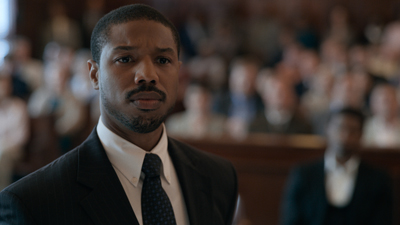 Netter recalls that the book had an equally powerful effect on him. "I was profoundly moved and felt that bringing Bryan's memoir to the screen had the potential to open people's eyes and hearts. My mission statement for my company has always been to make movies that show how putting good into the world can have a powerful and lasting impact. And certainly Bryan has brought hope to people who have been marginalized, not only by race but also by poverty. As Bryan says, 'The opposite of poverty isn't wealth, it's justice.'"
Netter recalls that the book had an equally powerful effect on him. "I was profoundly moved and felt that bringing Bryan's memoir to the screen had the potential to open people's eyes and hearts. My mission statement for my company has always been to make movies that show how putting good into the world can have a powerful and lasting impact. And certainly Bryan has brought hope to people who have been marginalized, not only by race but also by poverty. As Bryan says, 'The opposite of poverty isn't wealth, it's justice.'"
Fellow producer Asher Goldstein agrees. "Frankly, the narrative of this story is something that has been going on for a long time in this country, and it strikes a resounding resemblance to things that are still happening. We felt it was an important story to tell because it's extremely relevant."
Jamie Foxx, who plays Walter McMillian, reflects, "There was a racial domino that was pushed a long time ago, and we've yet to put a stop to them falling. So a movie like this is needed because, hopefully, people will come"Black, white, Asian, Latino, whoever"and leave the theatre with a different mindset and say, 'No, we don't want to see that happen anymore.'"
"Movies have a remarkable way of uniting us with people who are different from us," adds Brie Larson, who plays Bryan's colleague Eva Ansley in the film. "So the idea that folks who maybe aren't familiar with this issue, or who have a preconceived notion about the men and women on death row, could watch this film and have a new understanding of how our judicial system works, how it can fail us and how we can be of support is really important."
Although Just Mercy became a widely acclaimed bestseller, Bryan Stevenson says he was nevertheless surprised when Hollywood came calling, admitting he was hesitant at first about turning it into a film "because I wanted to stay true to the book. But once I got to spend time with Gil, Destin, Michael B. and Asher, I became excited about the opportunity to make a movie that could reach a wider audience and have a greater impact."
Stevenson continues, "I want people to understand the problems of bias and unfairness in our criminal justice system"a system that treats you better if you're rich and guilty than if you're poor and innocent. I sometimes think that people believe that there's no room for mercy in justice or that mercy is disconnected from justice. I chose the title Just Mercy as a way of describing mercy that is rooted in an understanding that we all fall down, that we all need grace, that we all need redemption, that none of us want to be judged by the worst thing we've ever done. And I wanted to convey the concept that mercy isn't what we give to the people whom we think deserve it; mercy is what we give to the people whom we think don't deserve it. It requires an understanding of not just who they are, but who we are. So I like that interplay between 'just' and 'mercy' in the title, which is meant to push past the idea that it's not only mercy, it's mercy that is just. I wanted that idea to be front and center."
The filmmakers all shared that objective and, to that end, worked closely with Stevenson throughout the development of the script. Andrew Lanham, who co-wrote the screenplay with Cretton, confirms, "We spent a lot of time interviewing him and his staff at EJI. We went over pretty much every draft of the script extensively with him. The goal for everyone at all times was, 'How can we stay true not only to Bryan's voice but also to his message?'"
Lanham goes on to relate, "It's impossible to interact with Bryan for more than five minutes and not be transformed in some way. No matter what your beliefs, there are some people who come into the world to be good souls and who can truly bring change. And when you meet one of those people, it's incredibly powerful."
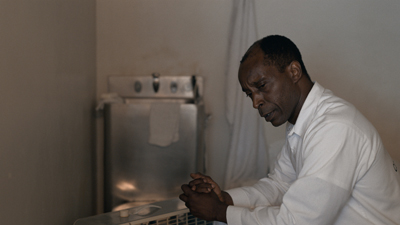 "Bryan has been our North Star in all of this," states Goldstein. "The fact is we could not have made this film without him guiding us to make sure the story we're telling is reflective of his experience. Destin is someone who strives for authenticity, and the partnership he had with Bryan was invaluable in getting as close to the truth as possible, especially since the story is told through Bryan's eyes."
"Bryan has been our North Star in all of this," states Goldstein. "The fact is we could not have made this film without him guiding us to make sure the story we're telling is reflective of his experience. Destin is someone who strives for authenticity, and the partnership he had with Bryan was invaluable in getting as close to the truth as possible, especially since the story is told through Bryan's eyes."
Having produced Cretton's film "The Glass Castle," Netter says he immediately thought of him to both write and direct "Just Mercy." "I just knew Destin would be a perfect match for Bryan's story. He is an exceptionally talented filmmaker, but most importantly, Destin has a deep level of emotional intelligence and genuine empathy for others. That's why his work is always emotionally in touch and so truthful."
"Destin is a man with seemingly endless understanding and humanity," concurs Larson, who counts "Just Mercy" as her third film under Cretton's direction, following "Short Term 12" and "The Glass Castle." "He stands for a lot of the same things that Bryan does, so it felt like a synergistic partnership. It's one thing to make a movie about compassion; it's another thing to live it and embody it and create a set that mirrors it. He is a tremendous support for every person, from the cast to his department heads and crew. They're like family."
Sharing that sentiment, Jordan says, "The positive energy Destin gave off and the tone he set is why our cast and crew was so close. It trickles down from the top and we all followed his leadership. It felt like magic because we had everyone coming together who really cared about this project and it created an environment to do something special. And as a producer, I felt the story had to be told by a person of color. Destin brings a certain honesty and real-life experience to his perspective."
"Just Mercy" is the first film produced under Warner Bros.' inclusion rider, ensuring that underrepresented groups, including women, people of color and those from the LGBTQ community are considered for key roles and positions on both sides of the camera. The policy was spearheaded by Jordan, who offers, "When you have an opportunity to do something positive that could have a lasting impact, I personally feel it would be a waste not to maximize that opportunity. That's what I'm trying to do with my body of work. I want to lead by example in the choices I make, not just talking it but walking it."
Recalling the first time he saw Jordan and Stevenson together, Cretton believes Jordan is already living up to that aspiration. "We were in Alabama visiting EJI and went to the Legacy Museum and the National Memorial for Peace and Justice. Watching the two of them walking through those monuments that memorialize victims of lynching, listening to Bryan sharing his vision and Michael B. relating to it was such a moving moment. Seeing them side-by-side, I felt so happy about that casting, but I was also struck by the fact that this wasn't just another role Michael B. was playing. I honestly think he was tapping into something in himself that went much deeper than this movie... I think we all were."
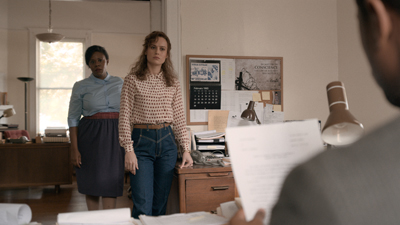 The Cast
The Cast
Walter
I can't believe you met my family.
Drove down that dirt road, crammed up in
that little house, talked to all my people,
say you gonna try to fight for me.
That mean a lot.
Bryan
It meant a lot to me, too.
In taking on the role of Bryan Stevenson, Jordan says that, in some respects, his preparation did not differ much from playing other parts. "My approach is to lock in and try and get the essence of a character." However, he continues, what set this role apart was his direct access to the man himself. "It was priceless to have Bryan around to pick up on his mannerisms and the way he speaks…all the small details that are specific to him, so that was the major difference in terms of prep.
"Oh, except for the fact that this character is a lawyer, and I haven't spent a lot of time in courtrooms, thank God, knock wood," Jordan laughs. "So just learning the legal terms and how to be comfortable in that environment is something I took seriously. I was able to call or text Bryan and ask, 'What would you do in this situation? How do you approach the bench? How do you deliver your opening statements or closing arguments?' Having him to lean on for guidance was so valuable, just to be as much like him as possible. But that's the fun of acting, right? We get to wear different hats and become other people. Each role calls for something new, and this time it was a suit and tie and briefcase, so that's cool."
"There are many reasons Michael B. was the perfect choice to play Bryan," says Cretton, "beyond the fact that he is an extraordinary actor. He is an extremely empathetic person who not only cares deeply about the subject matter of this film but also about properly representing Bryan because, like all of us, he holds him in very high regard."
Stevenson, in turn, has long admired Jordan's work, going back to his breakout role in HBO's "The Wire," and, more recently, "Fruitvale Station," which he calls "powerful." But more importantly, he says, "When we met, he seemed like the kind of person I would feel comfortable with. He's thoughtful and compassionate and genuine, and I value those qualities, so I was really excited when he signed on."
At the beginning of "Just Mercy," Bryan is still a law student and, as part of an internship with the Southern Prisoners Defense Committee, goes to meet Henry Davis, a death row inmate at the Georgia State Prison. That first encounter with someone condemned to die is as eyeopening as it is life-changing. Henry is the same age as Bryan, with a background not unlike his own, and Bryan is stunned by the realization that, given different circumstances, the young man facing execution could have been him. After graduation, he eschews his high-paying job offers and, instead, sets a course for Alabama to, as he tells his worried mother, "fight for the people who need help the most," regardless of the dangers.
"In a lot of ways," Cretton observes, "as Bryan is driving into Alabama, there is a very clear David versus Goliath angle. In every sense, he is the underdog: he's young, he's African American, and he's in a part of the country where those are huge marks against you with the established regime, especially with what he's trying to do. So he's really putting himself on the line. And isn't that what makes a hero?"
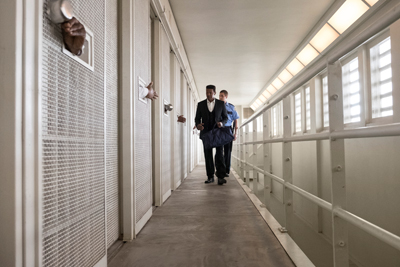 Entering Alabama's imposing Holman Prison, Bryan is immediately confronted with the reality of what it is to be a Black man vulnerable to white authority. Undeterred, he then meets with a litany of inmates who had little-to-no, or woefully inadequate, legal representation and who are grateful that someone is finally willing to listen and then possibly be in a position to help. All but one: Walter McMillian.
Entering Alabama's imposing Holman Prison, Bryan is immediately confronted with the reality of what it is to be a Black man vulnerable to white authority. Undeterred, he then meets with a litany of inmates who had little-to-no, or woefully inadequate, legal representation and who are grateful that someone is finally willing to listen and then possibly be in a position to help. All but one: Walter McMillian.
Explaining Walter's reluctance, Jamie Foxx says, "Walter was just driving home from his job when the cops pulled him over and falsely accused him of killing a white girl. They didn't want to hear his testimony; they wouldn't even listen to his family and friends who were with him at the time of the murder. So when his cell door closed, Walter believed he was going to die. By the time Bryan shows up, Walter is feeling hopeless because you can't afford to have hope on death row in Alabama, where no one had ever been freed."
Having been raised in Texas, Foxx says he had an innate understanding of his character, and the insights he gave Destin about what it means to be an African American in that world even influenced the screenplay. "When I met Destin, I was amazed by his passion for this project, but also by his willingness to listen to how it really feels to be Black growing up the South, where there was that racial component. It was part of the fabric of my life there. Now I still love my hometown, but I remember being called 'n***er' to my face, and you had to keep your head on a swivel when you were on the white side of town. I told Destin something I always say: It trips me out that a person gives me grief just because of the color I was born. What kind of person sees other ethnicities and labels them? I don't think we'll ever really know the reasons behind it, but there seems to be a whole lot of anger toward people over something they had nothing to do with. And Destin was blown away and actually put that into the script, where Walter talks about being guilty from the time you're born. So a film like this is necessary to keep knocking down that wall."
"It was such a joy to work with Jamie," Cretton says. "He's an actor who digs deep and performs from his soul. Every moment not only feels real but bubbling with life, and he is so present with the other actors. He also had an interesting process leading up to whatever scene we were going to shoot"he would play a specific song that would get him in the right mood. He had a whole playlist, from rock to old spirituals and gospel songs. And then right before we'd start filming, he'd stop, hide the speaker and go right into it. It was pretty remarkable. Even between takes…he could have gone back to his trailer at any time, but instead he would entertain everyone with music and stand-up routines. And to have that kind of positive attitude on set was really wonderful and contagious."
The strong bond formed between Walter and Bryan becomes more than just attorney and client. They become friends and partners in a true life-or-death mission. Although Jordan and Foxx had never acted together before, the two actors' own friendship goes back years. "I've known Michael since he was a kid," Foxx affirms, "so there was already that connective tissue. I've always been there to give him advice, which paralleled with Walter being the elder telling Bryan about how things were. So we definitely used that in portraying their relationship."
Jordan adds, "Jamie always has so many gems of wisdom and he was rooting for me every step of the way"every scene, every take. As an actor, he is a chameleon who dissolves into his character, and as a co-star, he's totally selfless and is willing to go above and beyond to give you whatever you need. And I think our chemistry really pays off on screen."
While Bryan is the lone attorney working to exonerate Walter, he is not working alone. At his side is local advocate Eva Ansley, who has put herself at odds with most in her neighborhood"and at personal risk"by teaming with him to help Walter and others in similar circumstances.
Speaking about her character, Brie Larson notes, "Eva doesn't have a law degree but is working from her heart. She was mortified by what was happening in her community and took it upon herself to start cold-calling lawyers to get these men fair representation. Bryan heard about what Eva was doing and reached out to her. She ends up working with him and then helps him start what became the Equal Justice Initiative. But it was really important to me that this film portrays Eva as an ally"someone who is there to lend a hand but isn't trying to preach or teach anything to Bryan."
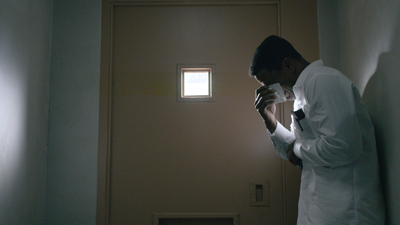 Cretton agrees. "When you meet Eva, she is a very strong woman in her own right, but she is very much there to support Bryan's vision and the movement and is not there for herself. Brie understood that in a beautiful way. She is a fantastic actress, and it was wonderful to have her on this film. If the role is right, I'll work with Brie every chance I get."
Cretton agrees. "When you meet Eva, she is a very strong woman in her own right, but she is very much there to support Bryan's vision and the movement and is not there for herself. Brie understood that in a beautiful way. She is a fantastic actress, and it was wonderful to have her on this film. If the role is right, I'll work with Brie every chance I get."
The feeling is mutual. "Any time Destin calls, I will be there," Larson states. "A lot of having a good collaboration on a movie is seeing the same thing, and I always feel like I'm seeing the same thing with Destin. Pretty early on, we created a shorthand that became so short, we didn't even need to talk anymore," she laughs. "It's like we have a kind of telepathy where I know exactly what he wants before he says it."
As Eva, the actress shares the screen with Jordan in all of her scenes and recalls, "You could feel when he was talking that this film and this subject mattered to him to his core. There were moments making this movie that I felt lucky I was present because they hit levels of transcendence that were like magic in the room. The air changes; something feels different. And I was able to experience that with him many times."
Like Jordan, Larson had the benefit of being able to connect with her real-life counterpart. "I had a lot of conversations with Eva, and I'm so inspired by her and what she represents. When I asked her about EJI's percentages of success, she said, 'Oh, I don't really pay attention to percentages; I just want to help as many people as I can.' She's learned that sometimes the best thing you can do for someone is to give them a sense of hope in hard times. That was the core of who Eva was for me: knowing that a huge part of this work is to be there for another person on a human level."
That level of support can also come from people caught in the same dire circumstances. On Holman's death row, Herbert Richardson and Anthony Ray Hinton are in neighboring cells to Walter's, and the three men have a brotherhood, forged in shared tragedy, that few could fully comprehend.
Jamie Foxx attests, "They have a strong connection with each other because they are all in the same boat and they're gonna sink or swim together. And the actors cast as Herb and Anthony were amazing; I can't say enough about them. Destin was great about giving us freedom to play because it helped form that immediate chemistry and allowed us to show, within a snapshot, that these three men have history."
Rob Morgan, who portrays Herbert Richardson, confirms, "Our characters have a natural bond and in their interaction, we, as actors, wanted to create a better understanding of these brothers being in this situation. We had such a great camaraderie on the set, and I believe that shows in the movie."
Although Herbert does not deny that he is guilty of the crime for which he was convicted, there were extenuating facts never presented at his trial, which might have saved him from the death penalty. Morgan explains, "He served honorably in Vietnam, but suffered from PTSD when he got back and was never treated adequately for it. Unfortunately, he committed a very heinous act, but might not have understood the totality of what he was doing in the condition he was in mentally at the time. When I read the script and saw how the dialogue flowed"dealing with such a sensitive subject but in a way you can digest it"I had to be part of it."
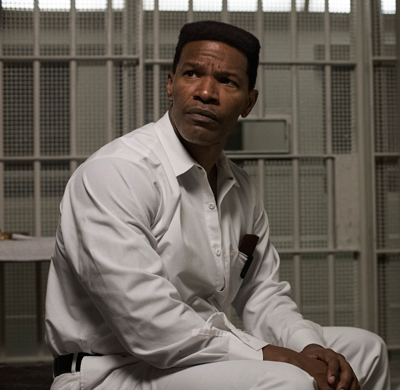 Taking up Herbert's case, Bryan empathizes with his guilt and remorse, but tries to impress upon him that he is worth saving, regardless of what he did. "Herbert always felt like nobody wanted to go to bat for him, but Bryan listens to him and tries to put his actions in a light so he could be understood," says Morgan.
Taking up Herbert's case, Bryan empathizes with his guilt and remorse, but tries to impress upon him that he is worth saving, regardless of what he did. "Herbert always felt like nobody wanted to go to bat for him, but Bryan listens to him and tries to put his actions in a light so he could be understood," says Morgan.
Cast as Anthony Ray Hinton, O'Shea Jackson Jr. shares, "When you're put on death row, you are brought there to die. And nobody seems to give a damn but this random dude, who sees something wrong and then puts in the work to try and change it. I mean, that's a hero."
Wrongfully convicted of murder, Anthony "never lets the walls squeeze in on him too much," Jackson relates. "He will sit in his cell and take his mind somewhere else. They can lock up his body, but they can't touch his spirit, they can't touch his mind. It's important to have that skill, to be mentally strong. When you are in a box all day, if you don't have some form of escape, it'll eat you alive, and Anthony does everything he can to prevent that from happening."
Jackson says he took inspiration from listening to interviews with the real Anthony Ray Hinton, remarking, "For him to go through what he did and still laugh, still joke, still smile… Right there, you know this guy's just got cold game. I knew I had to give him every bit of what I've got. It was definitely the heaviest role I've ever had, but I saw a sharp dude, quick as a whip, and a BS talker, like myself, so I was down from the jump."
As the only person involved in the film who knew the three men being portrayed personally, Stevenson has a unique perspective of the actors' depictions and has nothing but praise. "They truly brought Walter, Herbert and Anthony to life in ways that were powerful and moving. I think people who are put in jails and prisons, and death row in particular, are generally thought of as something less than human. What I loved about these performances is that Jamie, Rob and O'Shea each gave full humanity to the plight of someone who's been condemned, who's been told that their life has no value."
Outside the prison walls, there is another group of people pinning their renewed hopes on Bryan: Walter's family, who, having been with him on the day of the murder, knows he is innocent. They have no faith in the system that put Walter behind bars, but Bryan showing up provides their first glimmer of hope. Karan Kendrick, who plays Walter's wife, Minnie McMillian, says, "They are glad he is there, but at the same time, there is also a healthy dose of 'What is this young man going to be able to do?' The whole neighborhood turns out to meet him, so it's a kind of Southern vetting process. But it seems he earns the family's support and certainly Minnie's support…and gratitude."
Raised in rural Georgia, Kendrick calls Minnie "an embodiment of the community of mothers, sisters, aunts and grandmothers who raised me, so I connected with her very early on. Her journey resonated with me: Minnie is a woman who had every reason to walk away but chose to stay and is doing the best she can to hold her family together. I think there is an extraordinary amount of love in her to be able to stand up for what she believes, regardless of what she's endured in the past. She is committed to her family and she is also committed to both justice and mercy."
There are several obstacles standing in the way of Bryan achieving justice for Walter, the most formidable being the current District Attorney, Tommy Chapman, played by Rafe Spall. "He was not the D.A. at the time of Walter's trial, but he sees it as his job to uphold the conviction to protect the community," Spall relates.
Cretton notes, "Bryan's rebuttal to that is it's not Tommy's job to defend the conviction; it's his job to find the truth and seek justice, and if that means admitting they made a mistake, then that's what he should do. But that's often a very hard thing for people who are in charge to do."
"You see Bryan trying to chip away at his conscience," adds Jordan. "Is Chapman knowingly going to condemn a man to death that he knows is innocent?"
Spall concedes that his character doesn't think much of Bryan…at first. "He just graduated from Harvard and now he thinks he's going to come to the South to defend people in capital cases. Tommy thinks he's a joke; he's gonna eat him alive. Then he's presented with this highly intelligent, fiercely tenacious lawyer who scares the life out of him because Tommy knows he's on shaky ground with this case should it go to a retrial."
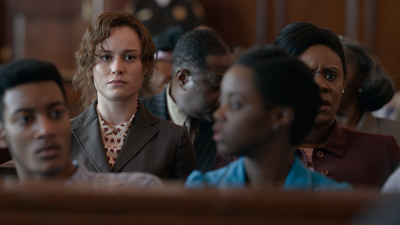 The British actor shares that perhaps the most challenging aspect of his role was mastering Tommy's thick Southern accent. In order to not only get the accent down but make it second nature, Spall spent weeks in Atlanta only speaking like Tommy Chapman. "I wanted to sound authentic, especially since my first day on set was in a courtroom in front of about 100 Southerners, which was one of the scariest things I've ever done, straight up."
The British actor shares that perhaps the most challenging aspect of his role was mastering Tommy's thick Southern accent. In order to not only get the accent down but make it second nature, Spall spent weeks in Atlanta only speaking like Tommy Chapman. "I wanted to sound authentic, especially since my first day on set was in a courtroom in front of about 100 Southerners, which was one of the scariest things I've ever done, straight up."
Spall needn't have worried. "A lot of the local extras had no idea Rafe was British; they thought he was a true Southern gentleman," Cretton recounts. "And on that first day in the courtroom, when Rafe finished his final speech, he got a standing ovation from everyone." The key witness for the prosecution in Walter's original trial was a career criminal named Ralph Myers, who was in custody for an unrelated crime. Actor Tim Blake Nelson is almost unrecognizable as Myers, who bears the scars of a traumatic childhood accident"some that are visible and others that go deeper.
"The prosecution was very lucky when they found Ralph, who was a pretty unstable guy with his own extremely difficult and damaging past," offers Nelson. So the sheriff was able to prey on his vulnerabilities to get him effectively to lie in support of their indictment, prosecution and eventual guilty verdict on Walter. And it's enormously tragic what they put him through to get him to testify."
Nelson watched video of the real Ralph Myers to, as he says, "find the essence of the man and be true to that. In this case, I probably went further than I ever have in terms of verisimilitude to try and be as indistinguishable as possible from the actual person." From a visual standpoint, Nelson worked with special effects makeup artist David Atherton to replicate Myers' scars. The actor also had to affect the way Myers spoke out of one side of his mouth as a result of his injury without, as he says, "making it look forced."
The main cast also includes CJ LeBlanc as Walter's son John McMillian; J. Alphonse Nicholson as Henry Davis; Michael Harding as Sheriff Tate; Hayes Mercure as Holman prison guard Jeremy Doss; and Charmin Lee as Bryan's mother, Alice Stevenson.
In "Just Mercy," there are also four people briefly seen as Holman inmates telling Bryan stories of their previous lawyers' incompetence or indifference. Interestingly, the interviewees are played by four real-life former inmates that Bryan Stevenson helped get released from prison: David Garlock, Robert Caston, Talmedge Hayes and Kuntrell Jackson, all of whom are sharing their own actual experiences.
Cretton has great admiration for his entire cast and expressed his gratitude to them in a way that reflected his roots. "I grew up in Hawaii and one of our traditions is to give flower leis on special occasions to symbolize love and appreciation. I am constantly floored and awestruck by what actors can do. I think it's very difficult to be that vulnerable and put yourself out there, and I felt extremely fortunate to be that close to witness it every day. I appreciate so much what every member of the cast brought to the film, and so when an actor wrapped, we gave them a lei and a hug…and then kicked them out," he laughs.
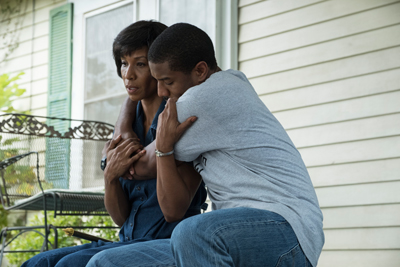 On Location
On Location
Walter
You don't know what you're into
down here in Alabama, when you're
guilty from the moment you're born.
"Just Mercy" was filmed on location in and around Atlanta, Georgia, with some establishing exterior sequences also accomplished in Montgomery, Alabama. Cretton says, "I really don't think we could have shot anywhere else because we were able to tap into the wonderful culture of Georgia and Alabama, as well as the great pool of talent they have in Atlanta on both sides of the camera. I was also very touched by how open people were to helping us tell this story. It's a testament to the fact that no matter where you go in the world, there are people who live their lives with compassion and empathy and can see that a story like this is important to be told."
Prior to principal photography, the various departments delved into research to denote accurately the period and setting. Production designer Sharon Seymour notes, "You might think the 1980s and 90s, being not that long ago, would be relatively easy, but a lot has changed since that time. Computer technology, for example, has changed drastically, so what we see in Bryan's law office is totally outdated compared to what we know now."
Cretton set up a Dropbox with all the research he had compiled, to which all the departments were able to contribute photos, clippings, archival footage and other reference materials they had gathered. Everything could then be shared among the teams.
They were also fortunate to have access to someone with firsthand knowledge of the time and place. Seymour explains, "Bryan Stevenson came to Atlanta and met with the creative teams. We had prepared a list of questions for him and scoured his memory for information that would help us."
Costume designer Francine Jamison-Tanchuck remarks, "Having Bryan as a resource was invaluable for me in terms of making sure I was designing the right look for Michael in portraying him. I asked him what colors he liked to wear in court and what kind of suits. He said he didn't want to draw attention to himself, so I was very conservative in the character's dress. In the courtroom scenes, he is either in a navy, charcoal gray or black suit and always with a white shirt."
Jamison-Tanchuck had worked with Jordan years earlier on "Hardball" so they have "a bit of history," she comments. "I knew he trusted me, but I was still very flattered when he put on the outfits, looked in the mirror and said, 'I feel like Bryan.' That is a big thumbs up for any costume designer."
For Larson's wardrobe, Jamison-Tanchuck asserts, "Brie and I agreed that Eva is not about clothes; she is about action and righting wrongs, so she would go to her closet and pick out a pair of jeans and a blouse and she's off and running. We gravitated toward pastel colors because of the season, and also kept things a bit vintage because they don't have a lot of money, so she could shop at thrift stores and think nothing of it. Eva was probably recycling clothes before it was fashionable," she smiles.
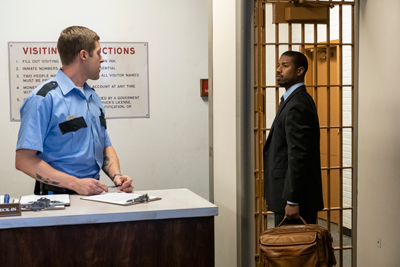 In general, the costume designer did not want the clothing to be too on trend for the timeframe, explaining, "This is a small town in Alabama so they would do their shopping in local stores, and the internet wasn't as accessible yet, so everyone would not be in on the latest fashions."
In general, the costume designer did not want the clothing to be too on trend for the timeframe, explaining, "This is a small town in Alabama so they would do their shopping in local stores, and the internet wasn't as accessible yet, so everyone would not be in on the latest fashions."
The production utilized a wide variety of practical locations in the vicinity of Atlanta, which stood in for Montgomery and Monroeville, Alabama, where the murder for which Walter was wrongly convicted took place. Stevenson relates, "Monroeville is where Harper Lee wrote To Kill a Mockingbird, and millions have read that book and celebrated the advocacy of Atticus Finch without recognizing that the indigent black man doesn't actually get justice. And the irony of a community that proudly embraces that story but at the same time was indifferent to the wrongful conviction of this black man seemed to me a good lens for exploring what happens in our justice system."
The only major set built on a soundstage was Holman Prison's notorious death row, a portion of which was replicated at Tyler Perry Studios in Atlanta. Seymour details, "We knew death row was something we would never be able to access in a practical location, so it had to be created. The cells measure five feet by seven feet and metal mesh was welded onto the bars to add to the claustrophobic feeling. We wanted to give the audience an understanding of how it felt for these men to be living in small cages."
Together with his longtime cinematographer Brett Pawlak, Cretton utilized the camera to amplify the claustrophobic nature of the scenes on death row. "What I love about working with Brett is he can be extremely innovative but can also make choices that are equally beautiful in their simplicity, if that's what the scene calls for," the director shares.
"I'm always excited to work with Destin," says Pawlak. "He comes in with very specific perspectives on composition, lighting, color… But he also gives me the freedom to explore other options and then we develop everything together."
Closing Thoughts
Bryan
…If we can look at ourselves closely,
and honestly, I believe we will see
that we all need justice, we all need mercy
and we all need some measure of unmerited grace.
In post-production, Cretton worked with editor Nat Sanders in the cutting room and with composer Joel P West on the scoring stage to complete work on "Just Mercy."
In creating the score, West says he incorporated several different music genres. "There are influences of jazz, gospel, R&B and hip-hop. Bryan Stevenson grew up playing keyboards in the AME Church, so I also wanted to bring hints of that into the score. We didn't try to mimic any singular style but just have elements of those vibrant histories and traditions."
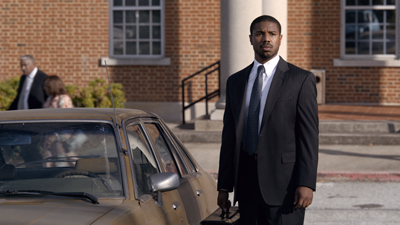 West took a distinctive approach in the composition of the score to echo what Bryan is facing as the story unfolds. "The music is very cyclical," he explains, "with almost a broken record feeling, because that is the world that Bryan is working in in the film"where people are stuck in a system of institutionalized racism and indifference, and no matter how hard Bryan is trying to beat it, it just keeps resetting. So we built a lot of the music to feel like it's stuck in a cycle, and only towards the end of the movie does it start to open up and break out of that cycle."
West took a distinctive approach in the composition of the score to echo what Bryan is facing as the story unfolds. "The music is very cyclical," he explains, "with almost a broken record feeling, because that is the world that Bryan is working in in the film"where people are stuck in a system of institutionalized racism and indifference, and no matter how hard Bryan is trying to beat it, it just keeps resetting. So we built a lot of the music to feel like it's stuck in a cycle, and only towards the end of the movie does it start to open up and break out of that cycle."
Bryan's life's work is what inspired everyone involved in "Just Mercy" to take part in making the film…and it continues to inspire them. Cretton reflects, "Every film is a learning process in some way, but this one, in particular, has been for me. I personally feel like a student to Bryan Stevenson and the wealth of knowledge that he has graciously shared with all of us. The most amazing thing to me is that here is a man who is faced daily with so many huge trials and the ugliness of what humans are capable of doing to each other, but here also is a man who is one of the most hopeful people I've ever met. How he can still hold onto so much hope while doing this work is one of the most extraordinary things I've ever encountered."
Jordan concurs, "I applaud this man, and I'm in awe of his resilience, his perseverance, his optimism, and his dedication to this cause. No matter how dismal things seem, he sees the silver lining. He sees the light at the end of the tunnel. He sees a way to get to yes. And that is one of the most important and most impressive things about him that I've taken with me. I refuse to let that part go"
"We want the film to reinforce the power of hope," Stevenson asserts. "I am persuaded that hopelessness is the enemy of justice. And if you allow yourself to be hopeless about what you can't do, you become part of the problem. So that dynamic was very important for the story."
Cretton concludes, "It's easy to feel like the problems we see in the world are too big to even try to tackle. But the achievements of Bryan Stevenson and his team at EJI are proof that there is something that we can do. My own hope is that when people watch this movie, a small part of them will be able to push aside their own personal fears or anxieties and be motivated to do something about that thing that they know is wrong"some injustice, big or small, that they think they can't do anything about. I hope this movie lets them know that they can."
Release Date: January 23rd, 2020
MORE



